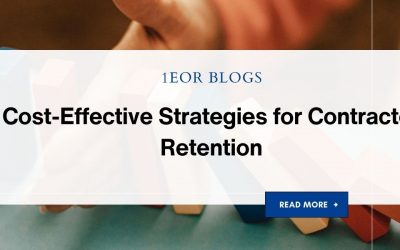In today’s fast-paced job market, retaining top talent is a significant challenge for organizations. High employee turnover leads to increased recruitment costs, lower productivity, and reduced team morale. Recruitment Process Outsourcing (RPO) has emerged as a powerful solution to address this challenge. By outsourcing recruitment functions to specialized agencies, companies can ensure a more effective hiring process, ultimately enhancing employee retention rates. Partnering with an RPO like 1eor can help you not only streamline your hiring process but also improve employee retention by ensuring a better cultural fit and long-term satisfaction.
This article explores “The Role of RPO in Improving Retention Rates”, shedding light on its benefits, strategies, and impact on long-term workforce stability. We will examine how RPO providers streamline hiring processes, create better employee experiences, and improve retention. Let’s dive into how RPO can be a game-changer for modern organizations striving to build a loyal workforce.
Why Employee Retention Matters
Retaining employees is crucial for business growth and sustainability. High turnover rates not only affect productivity but also damage a company’s reputation. Organizations that struggle with high attrition often face these challenges:
- Increased hiring costs: Recruiting, training, and onboarding new employees require significant financial investment.
- Loss of institutional knowledge: Frequent turnover results in the loss of experienced professionals, affecting operational efficiency.
- Reduced team morale: Constant changes in the workforce can create instability and lower employee motivation.
- Lower productivity: New employees take time to adapt, impacting overall performance.
By implementing an RPO strategy, organizations can mitigate these issues and create a more stable workforce.
How RPO Enhances Employee Retention
1. Strategic Talent Acquisition
A well-structured RPO model focuses on hiring candidates who align with a company’s culture and long-term goals. RPO providers use data-driven techniques to assess candidates, ensuring they are the right fit for the organization.
Key elements of strategic talent acquisition:
- Competency-based hiring: Identifying skills and cultural fit before onboarding.
- AI-powered screening tools: Automating the selection process for better accuracy.
- Employee persona analysis: Defining ideal candidate profiles for better hiring outcomes.
By prioritizing quality over quantity, RPO providers help companies hire individuals who are more likely to stay for the long term.
2. Improved Candidate Experience
A poor recruitment experience can lead to high dropout rates. RPO firms enhance candidate engagement by ensuring smooth communication, transparent hiring processes, and a positive onboarding experience.
Benefits of an improved candidate experience:
- Faster response times: Reducing wait periods and keeping candidates engaged.
- Personalized interactions: Providing feedback and guidance throughout the hiring process.
- Efficient onboarding: Structured onboarding programs that help new hires integrate seamlessly.
A well-managed recruitment experience leaves a lasting impression on new employees, increasing their commitment to the company.
3. Data-Driven Decision-Making
One of the major advantages of RPO solutions is their reliance on data analytics. Companies can use these insights to refine their hiring strategies and understand employee behavior patterns.
Data-driven hiring benefits include:
- Predictive analytics: Identifying factors that contribute to employee retention.
- Workforce planning: Optimizing recruitment strategies based on workforce demand.
- Employee feedback analysis: Using surveys to improve workplace satisfaction.
When organizations leverage RPO-driven analytics, they can proactively address retention challenges before they escalate.
4. Employer Branding and Employee Value Proposition (EVP)
A strong employer brand attracts and retains top talent. RPO partners help businesses build a compelling EVP that differentiates them from competitors.
Key components of a strong EVP:
- Competitive compensation packages
- Career growth opportunities
- Work-life balance initiatives
- Recognition and rewards programs
Companies that focus on employer branding through RPO strategies can create a work environment where employees feel valued and motivated to stay.
5. Continuous Engagement and Development
Retention does not stop at hiring. Continuous employee engagement is essential for long-term success. RPO firms assist organizations in developing training programs, career advancement initiatives, and mentorship opportunities.
How continuous engagement impacts retention:
- Skill enhancement programs: Helping employees grow within the organization.
- Regular feedback sessions: Encouraging open communication and addressing concerns.
- Employee wellness initiatives: Supporting mental and physical well-being.
By maintaining an engaged workforce, businesses can foster loyalty and reduce attrition rates.
Comparing In-House Recruitment vs. RPO for Retention
| Aspect | In-House Recruitment | RPO Recruitment |
|---|---|---|
| Cost | Higher due to advertising and internal HR expenses | Lower as RPO firms optimize hiring costs |
| Speed | Slower due to limited resources | Faster with automated processes and expert teams |
| Quality of Hire | Inconsistent due to traditional methods | Higher with data-driven selection processes |
| Scalability | Limited by internal constraints | Flexible and adaptable to business needs |
| Retention Rates | Lower due to ineffective hiring | Higher with strategic workforce planning |
This table highlights why companies increasingly prefer RPO services to improve employee retention and streamline hiring processes.
FAQs on The Role of RPO in Improving Retention Rates
1. What is RPO, and how does it improve retention?
RPO (Recruitment Process Outsourcing) is when companies delegate their hiring processes to external experts. RPO enhances retention by hiring the right candidates, improving onboarding experiences, and ensuring continuous engagement.
2. How does RPO differ from traditional recruitment?
Unlike traditional hiring, which relies on in-house HR teams, RPO utilizes advanced tools, data analytics, and industry expertise to make smarter hiring decisions.
3. Can RPO reduce recruitment costs?
Yes, RPO providers optimize recruitment expenses by reducing advertising costs, streamlining processes, and improving retention rates, leading to long-term savings.
4. Does RPO help with employer branding?
Absolutely! RPO experts help build a strong employer brand by improving candidate experiences, enhancing workplace culture, and implementing engagement strategies.
5. What industries benefit the most from RPO services?
Industries with high turnover rates, such as healthcare, IT, retail, and finance, benefit significantly from RPO-driven retention strategies.
6. How does RPO use data to improve retention?
RPO firms leverage AI, predictive analytics, and employee feedback to refine hiring strategies and create long-term retention plans.
7. Can small businesses benefit from RPO?
Yes! RPO is scalable, making it suitable for businesses of all sizes, helping them attract and retain top talent without a hefty internal HR team.
8. How long does it take to see retention improvements with RPO?
Companies usually see improvements within six months to a year, as RPO partners implement strategic hiring and engagement initiatives.
Conclusion
The importance of “The Role of RPO in Improving Retention Rates” cannot be overstated. With rising turnover rates affecting businesses worldwide, organizations must adopt smarter hiring strategies to secure long-term success. RPO services not only enhance recruitment efficiency but also foster a work environment where employees feel valued and engaged.
If your company is struggling with high attrition, now is the time to explore RPO solutions and build a stronger, more committed workforce. Investing in RPO-driven recruitment strategies today can save you from costly turnover challenges in the future.
Take the first step towards a more sustainable and thriving workplace with RPO!


